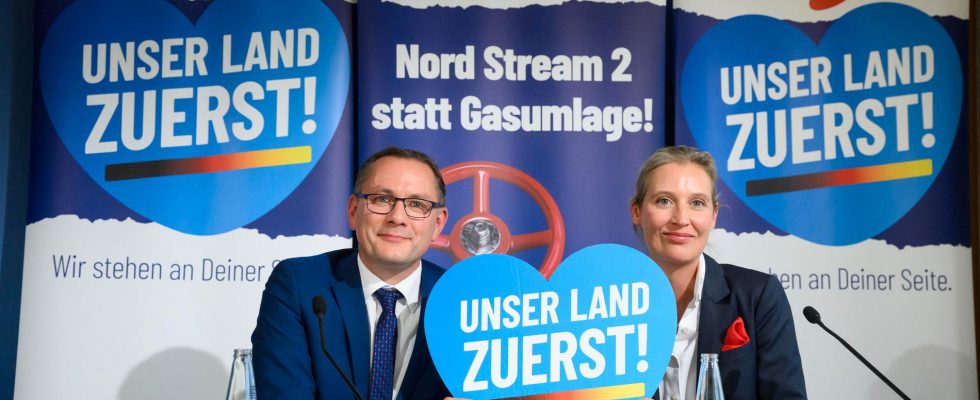full screen
Next
Tino Chrupalla and Alice Weidel share the party leadership of Alternative for Germany. Here they launched the campaign “Our country first!” in September last year, with a message that the Nord Stream 2 gas pipeline to Russia needed to be commissioned. Archive image.
1 / 2 Photo: Bernd von Jutrczenka/DPA via AP/TT
During the war year, the controversial far-right party AFD has grown again in Germany.
Russia has done its part to fire on the political fringes to undermine support for Ukraine.
In a year’s time, the radical Alternative for Germany (AFD) has gone from about 10 percent in the opinion polls to about 18, according to, among other things, a comparison made by the web magazine Politico. It basically touches the ruling and social democratic SDP in the place as Germany’s second most popular party after the Christian democratic CDU.
There have long been currents of Russian sympathies within AFD, with many and well-documented contacts between the party and Russian representatives. After Russia’s full-scale invasion of Ukraine, there has been a dispute within the party about how it should approach the war. It has been described by management as a “tragedy”.
“Wants peace”
AFD accuses the German government of actively destroying the country’s economy and trying to drag the country into a war. They contest EU sanctions against Russia, believe that economic ties to Russia should be restored and entered the final battle for the Nord Stream gas pipelines to be commissioned.
Party leader Tino Chrupalla has partly blamed the US for having provoked the war. Germany decided to send weapons to Ukraine after a major shift away from an earlier and, for historical reasons, cautious defense policy. There, AFD has taken a pacifist line.
– We want peace between all the peoples of Europe, which includes Ukraine as well as Russia, Chrupalla has said, among other things, which has been widely noticed by state-run Russian media.
He and other leading figures within AFD attended a reception at the Russian Embassy in Berlin a month ago, where the Russian Victory Day was celebrated.
Support for AFD is greatest in the German federal states that were formerly part of East Germany.
Revealed plan
Assessors argue that the AFD has capitalized on again growing migration to Germany, but also on the rising cost of living and on new legislation to limit the use of fossil fuels.
In addition, Russia has actively worked for the political extremes – both the AFD on the right and pro-Russian tendencies in Die Linke on the left – to unite to advance the Kremlin’s cause, according to leaked Russian documents that The Washington Post reported on in April.
In the work to undermine the outside world’s support for Ukraine, Germany would have the highest priority, according to a plan that the Kremlin’s deputy chief of staff is said to have presented to a group of political strategists last July. The goal has been to bring about greater resistance to any form of interference in the Ukraine war – so that the war will eventually reach some kind of end on Russian terms.
